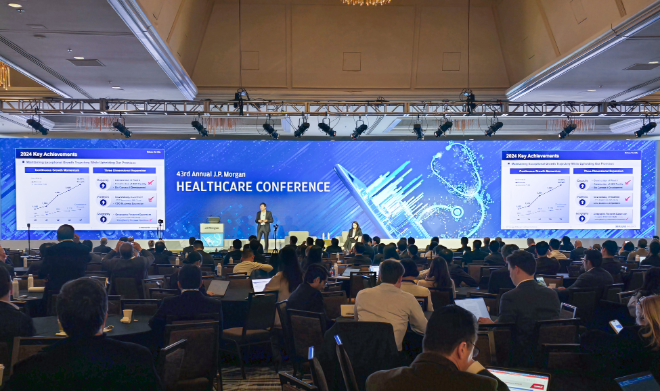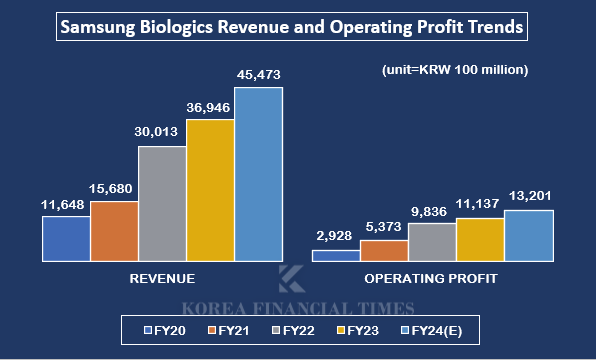 이미지 확대보기
이미지 확대보기According to Samsung Biologics on the 23rd, the company achieved consolidated revenue of KRW 4.5473 trillion and operating profit of KRW 1.3201 trillion last year, marking year-on-year growth of 23% and 19%, respectively. In Q4 alone, the company posted its highest-ever quarterly performance with a 17% increase in revenue. Following its milestone of exceeding KRW 3 trillion in annual revenue in 2022, Samsung Biologics has once again taken a significant leap forward.
Behind this success lies the company's "overwhelming production capacity." All three of its initial plants operated at full capacity last year, with its fourth plant also contributing significantly to revenue growth as its operational rate increased. The fourth plant, which began full-scale operations in June 2023, played a major role in driving revenue.
High-quality standards also played a critical role. Currently, Samsung Biologics counts 17 of the top 20 global pharmaceutical companies as clients. Last year, the company won three large contracts worth KRW 1 trillion out of a total of KRW 5.4035 trillion in annual orders, and all three were with global pharmaceutical companies. A company representative said, "We are strengthening partnerships with global clients based on our superior quality competitiveness.“
 이미지 확대보기
이미지 확대보기Samsung Biologics plans to continue to expanding its scale this year as part of its 'unrivaled capacity' strategy. This April, its fifth plant, with a production capacity of 180,000 liters, is set to begin operations. Once operational, Samsung Biologics’ total production capacity will reach 784,000 liters. For comparison, Celltrion, another Korean CDMO (contract development and manufacturing organization), currently operates at a total capacity of approximately 250,000 liters.
The company has already laid out a long-term plan to expand production capacity to eight plants. This year, Samsung Biologics plans to present investment proposals for constructing a sixth plant to its board of directors. When the sixth plant is completed in 2027, the company’s capacity will increase by an additional 180,000 liters, reaching a total of 964,000 liters. When all eight plants are completed in 2032, the company will have a total capacity of 1.32 million liters, nearly double the capacity of Switzerland's Lonza (780,000 liters) and Japan's Fujifilm (750,000 liters), which are among the top three global CDMOs alongside Samsung Biologics.
Particular emphasis will be placed on emerging modalities, such as antibody-drug conjugates (ADCs) and cell and gene therapies (CGTs), as these areas are expected to grow significantly. As part of this, Samsung Biologics, along with Samsung C&T and Samsung Bioepis, has established the 'Samsung Life Science Fund' to invest in promising biotech companies. Last year, the fund provided financial support to companies such as BrickBio, Latus Bio, Generate Biomedicines, and Flagship Pioneering, a startup venture capital firm.
The company is also accelerating its portfolio expansion. In 2024, Samsung Biologics launched five new technology platforms and customized service packages, boosting its competitiveness in contract development (CDO). Additionally, in December 2024, the company completed a dedicated ADC production facility and aims to establish an ADC drug product (DP) production line by Q1 2027.
Samsung Biologics has set a revenue target of KRW 5.5705 trillion for 2025. Already, on January 14, the company secured a massive KRW 2 trillion contract with a European pharmaceutical company, marking its largest contract to date at $1.41 billion (approximately KRW 2.0747 trillion). Furthermore, the potential benefits of U.S. policies under a second Trump administration—such as measures to curb Chinese competitors and support biosimilars—may present additional growth opportunities for Samsung Biologics.
A company representative remarked, "We will continue to work closely with our clients to ensure the rapid and stable supply of medicines," adding, "We plan to accelerate our three-pronged strategy of expanding production capacity, diversifying our portfolio, and strengthening global hubs to sustain our growth momentum.“
Meanwhile, on a standalone basis, Samsung Biologics recorded KRW 3.4971 trillion in annual revenue and KRW 1.3214 trillion in operating profit last year. Its subsidiary, Samsung Bioepis, posted revenue of KRW 1.5377 trillion and operating profit of KRW 435.4 billion during the same period.
Kim Nayoung, Korea Finacial Times (steaming@fntimes.com)
[관련기사]
- K-PharmaBio, Will 20 Years of R&D See the Light?… Expectations for 10th FDA and 1 Trillion Blockbuster Increase↑
- Overseas is the answer?... Yuhan Corp. · GC Bio, etc. Pharmabio industry, Q3 profits soar on 'global' ride
- Celltrion Enters CDMO… “Achieving KRW 3 Trillion in Sales by 2031”
- 'COVID-19 bad times over' Youngjin Pharmaceuticals' operating profit soars 180% last year...'What's the secret to its rapid growth?
- GC Group's 3 generations making their presence felt...'uncle-nephew' is gone, 'cousin management' is coming
- What is the strategy of Celltrion Chairman Seo Jung-jin, who created the '1 trillion blockbuster', to achieve 'KRW 10 trillion in sales within 3 years'?
가장 핫한 경제 소식! 한국금융신문의 ‘추천뉴스’를 받아보세요~
데일리 금융경제뉴스 Copyright ⓒ 한국금융신문 & FNTIMES.com
저작권법에 의거 상업적 목적의 무단 전재, 복사, 배포 금지













![Samsung Electronics and SK Hynix Engage in High-Stakes AI Chip War [KFT Topic]](https://cfnimage.commutil.kr/phpwas/restmb_setimgmake.php?pp=006&w=284&h=214&m=5&simg=2026013013432407964141825007d12411124362.jpg&nmt=18)
![Hyundai Mobis Posts Record Results, Pivots to Robotics and Electrification [KFT Topic]](https://cfnimage.commutil.kr/phpwas/restmb_setimgmake.php?pp=006&w=284&h=214&m=5&simg=2026012911595100522141825007d12411124362.jpg&nmt=18)
![One Year In: CEO Hyun Shin-kyun Transforms LG CNS into KRW 6 Trillion AI Powerhouse [KFT Topic]](https://cfnimage.commutil.kr/phpwas/restmb_setimgmake.php?pp=006&w=284&h=214&m=5&simg=2026012807381208149141825007d12411124362.jpg&nmt=18)
!['Chung Eui-sun Declares Robot Management Era'... Hyundai Motor Group to Lead Robotics Age with 'Physical AI' [KFT Topic]](https://cfnimage.commutil.kr/phpwas/restmb_setimgmake.php?pp=006&w=284&h=214&m=5&simg=20260106111449071567492587736121125197123.jpg&nmt=18)
![Lee Jae-yong and Chey Tae-won, Korea's 'Semiconductor Duo,' Head to China... What's the Status of Local Operations? [KFT Topic]](https://cfnimage.commutil.kr/phpwas/restmb_setimgmake.php?pp=006&w=284&h=214&m=5&simg=2026010608232205705141825007d12411124362.jpg&nmt=18)
!['Beyond Mobile to Robotics': LG Innotek Continues Portfolio Expansion [KFT Topic]](https://cfnimage.commutil.kr/phpwas/restmb_setimgmake.php?pp=006&w=284&h=214&m=5&simg=2026010508201109906141825007d12411124362.jpg&nmt=18)
![Doosan Enerbility Eyes Return to 'A' Credit Rating After 9 Years on Nuclear Power and Gas Turbine Boom [KFT Topic]](https://cfnimage.commutil.kr/phpwas/restmb_setimgmake.php?pp=006&w=284&h=214&m=5&simg=2026010208511504157141825007d12411124362.jpg&nmt=18)
!["Samsung Is Back," Chip Chief Declares, Eyeing Record Profit on HBM Recovery [KFT Topic]](https://cfnimage.commutil.kr/phpwas/restmb_setimgmake.php?pp=006&w=110&h=79&m=5&simg=2026011408580109459141825007d12411124362.jpg&nmt=18)
![Koo Kwang-mo's Vision for AI and Robotics Drives LG Group's Transformation [KFT Topic]](https://cfnimage.commutil.kr/phpwas/restmb_setimgmake.php?pp=006&w=110&h=79&m=5&simg=2026012123034202714141825007d122461258.jpg&nmt=18)
!['Expansion' S-OIL vs. 'Caution' GS Caltex [KFT Topic]](https://cfnimage.commutil.kr/phpwas/restmb_setimgmake.php?pp=006&w=110&h=79&m=5&simg=2026012010260905723141825007d12411124362.jpg&nmt=18)
![One Year In: CEO Hyun Shin-kyun Transforms LG CNS into KRW 6 Trillion AI Powerhouse [KFT Topic]](https://cfnimage.commutil.kr/phpwas/restmb_setimgmake.php?pp=006&w=110&h=79&m=5&simg=2026012807381208149141825007d12411124362.jpg&nmt=18)
![Samsung's 'Last Chance': Lee Jae-yong Pushes HBM4 as Make-or-Break Moment [KFT Topic]](https://cfnimage.commutil.kr/phpwas/restmb_setimgmake.php?pp=006&w=110&h=79&m=5&simg=2026012623242806011141825007d122461258.jpg&nmt=18)